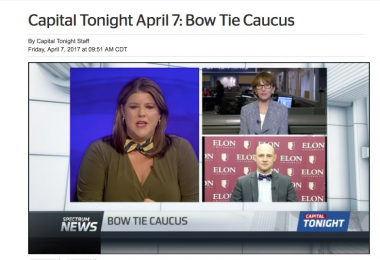Jason Husser, assistant professor of political science and director of the Elon University Poll, was recently a guest on Capital Tonight's "Bow Tie Caucus" and was interviewed for a segment by WFMY News 2 on a recently filed bill in the N.C. legislature.
Jason Husser, assistant professor of political science and the director of the Elon University Poll, was recently featured in two media segments looking at the confirmation of the newest U.S. Supreme Court justice and a new bill in North Carolina relatived to same-sex marriage.

Given other recent events dominating the news cycle recently, Husser said that the significance of the change isn’t being fully appreciated, and the impact goes beyond U.S. Supreme Court nominees. “These procedural changes in the Gorsuch nomination are truly historic,” Husser told host Loretta Boniti. “The change to the filibuster rules is a really monumentous change. … It’s a fairly slippery slope to get rid of the filibuster for legislation, not just appointees.”
Husser was also called on CBS affiliate WFMY News 2 to offer commentary about a bill filed in the N.C. House that would direct the state to disregard earlier U.S. Supreme Court activity that established same-sex marriage bans, like one formerly in place in North Carolina, as unconstitutional. Husser said such a bill, which is unlikely to move forward, likely serves some political purpose for its authors and supporters.
“They’re able to engage their point and say, at least to them, this issue in the culture war still rages,” Husser said. “If this piece of legislation passed, it would immediately be ruled unconstitutional. It would never have the force of law.”
The online version of the story was later published by USA Today.


